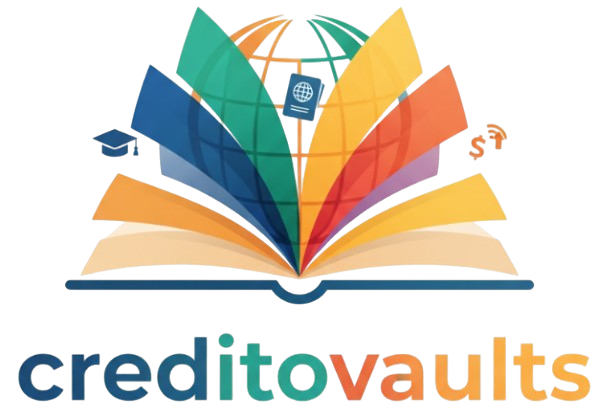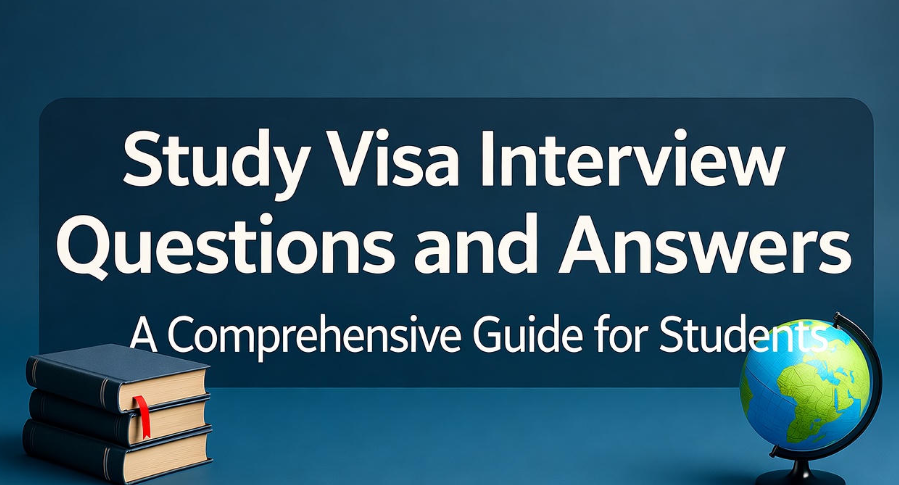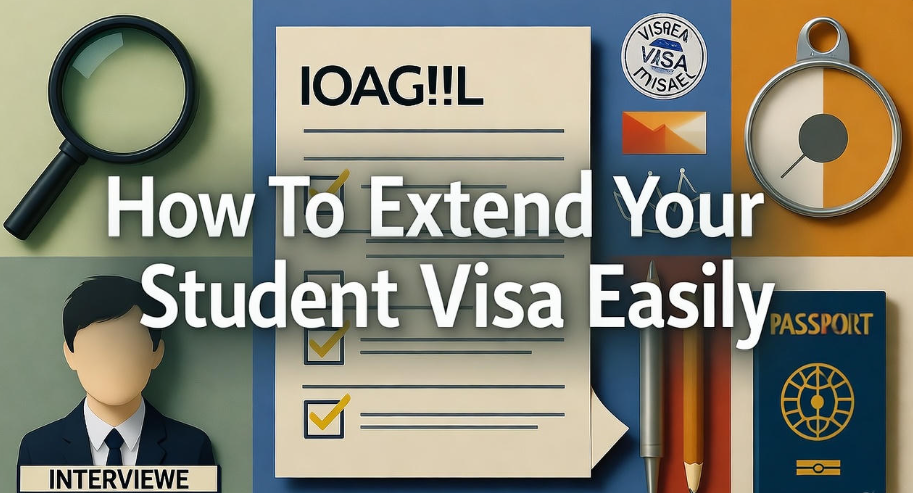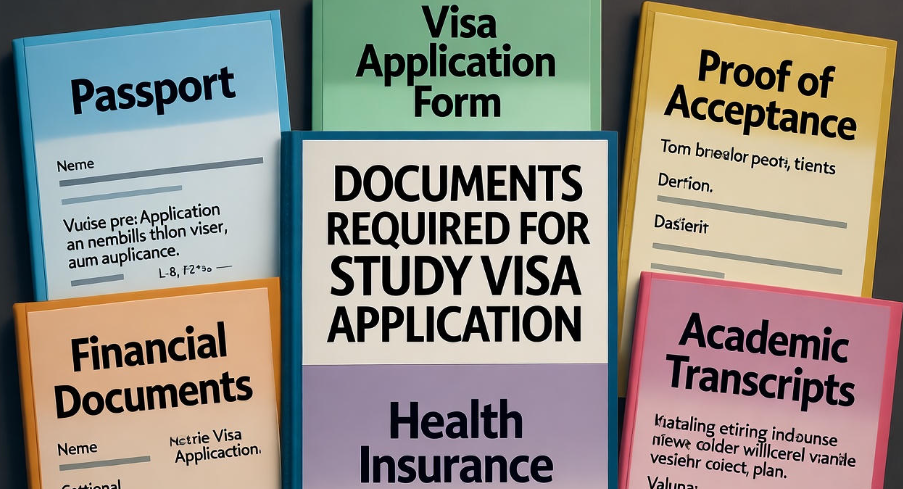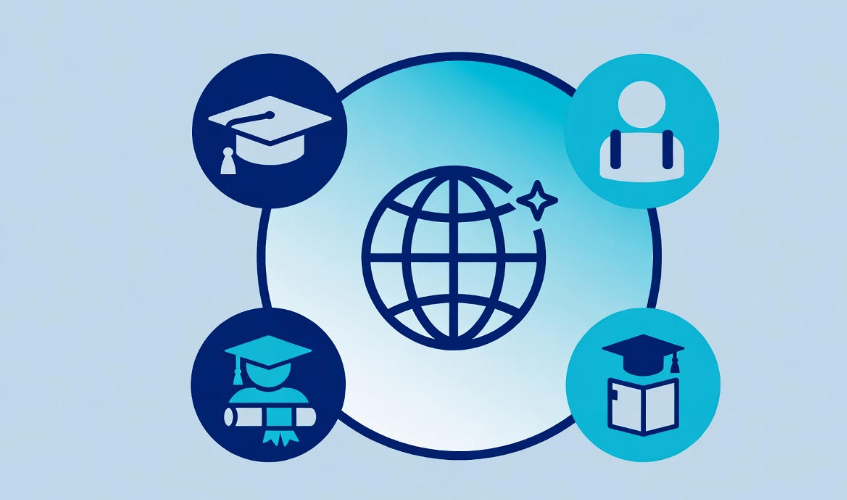Getting ready for a study visa interview can feel a little scary, right? But don’t worry — if you know what to expect and prepare your answers smartly, it becomes much easier. In fact, most interviews are simply meant to check if you are a genuine student and if your intentions to study abroad are clear.
Below, you’ll find real common visa interview questions, their best sample answers, and a few tips to help you stand out. Let’s make sure you walk in confident, calm, and ready!
Why do you want to study in this country?
This question checks your motivation and if you truly know why you picked that specific country.
Example Answer:
“I chose Canada because of its world-class education system, practical learning approach, and safe environment for international students. The universities there focus on research and innovation, which perfectly matches my career goals. Plus, Canada offers post-study work opportunities that help students gain real experience.”
✅ Tip: Don’t say things like “because I want to live there permanently.” Visa officers want to see that your main goal is education, not immigration.
Why did you choose this university?
This one checks whether you actually researched the university or just applied randomly.
Example Answer:
“I selected University of Toronto after comparing several universities. It has one of the best programs in Computer Science, excellent research labs, and strong connections with tech companies. Also, the faculty profiles really inspired me — especially Professor John Smith, whose work on Artificial Intelligence aligns with my interests.”
✅ Tip: Always mention 1–2 real facts about the university to show genuine interest.
What course are you going to study and why?
They want to know if you understand your course and how it fits into your career path.
Example Answer:
“I am going to study Bachelor of Business Administration because I want to build a career in international business. This course gives me practical knowledge about management, marketing, and global trade — which are essential for running or working in global organizations.”
✅ Tip: Always connect your course to your future plans.
How did you choose this course?
They want to see if you have a purpose behind your decision.
Example Answer:
“I reviewed several programs and realized this course matches my previous studies and my interest in entrepreneurship. It combines both theory and real-world projects, helping me develop management and leadership skills.”
✅ Tip: Show that you’ve done proper research and your decision wasn’t random.
Who is sponsoring your education?
This question is about financial stability. They want to ensure you can afford tuition, living expenses, and return travel.
Example Answer:
“My father is sponsoring my education. He works as a government employee and has been saving for my higher studies for years. I also have a bank statement and income proof to support my visa file.”
✅ Tip: Be honest. Provide documents and show that you understand how your studies are being funded.
What does your sponsor do?
Example Answer:
“My father owns a small construction business. His annual income is around $20,000, and he has been running the company successfully for over 10 years. We also have property and savings that cover my full tuition and living cost.”
✅ Tip: Be prepared with financial documents and income details.
How much does your course cost per year?
Example Answer:
“The total tuition fee is around $18,000 per year, and my estimated living expenses are $10,000 per year. I have already paid my first semester’s tuition and arranged funds for the remaining period.”
✅ Tip: Don’t hesitate — know the exact numbers before the interview.
Do you plan to work while studying?
Example Answer:
“Yes, but only part-time as per the visa rules. My priority is my studies, but I may take a part-time job to gain experience and support minor expenses.”
✅ Tip: Never say you plan to work full-time. It signals your focus is not academics.
What are your future plans after completing your studies?
This question checks your intention to return home after studies.
Example Answer:
“After completing my degree, I plan to return to my home country and work in a multinational company. The skills I’ll gain abroad will help me get better job opportunities here.”
✅ Tip: Always mention your home country in your future plan. Avoid saying you’ll “stay forever.”
Have you ever been refused a visa?
Example Answer:
“Yes, I was refused once because of missing financial documents, but I have now completed all requirements and ensured everything is accurate.”
—or—
“No, this is my first time applying.”
✅ Tip: Always tell the truth. The embassy already has your past record.
Where will you stay during your studies?
Example Answer:
“I have booked on-campus accommodation through the university’s student housing portal. It’s close to the library and labs, which makes it convenient for studying.”
✅ Tip: Show you’ve made clear plans and arrangements.
Why not study in your home country?
Example Answer:
“My home country has good universities, but they lack the research facilities and international exposure that I’ll get abroad. Studying overseas will give me a global perspective and improve my career prospects when I return.”
✅ Tip: Keep it respectful. Don’t speak negatively about your country.
Can you tell me something about your academic background?
Example Answer:
“I completed my Bachelor’s in Computer Science in 2023 with a 3.5 CGPA. I’ve also done internships in software development and participated in coding competitions, which helped me decide to pursue higher studies in Artificial Intelligence.”
✅ Tip: Keep your answer short and to the point.
How will this course help you in your career?
Example Answer:
“This course will strengthen my technical knowledge and communication skills, making me more employable in my field. It will also help me connect with international professionals and open up new career paths.”
✅ Tip: Be specific about skills and goals.
Have you applied to other countries or universities?
Example Answer:
“Yes, I applied to two other universities in Canada, but this one is my top choice because of its program structure and location.”
✅ Tip: Don’t sound desperate or confused. Be confident in your selection.
Do you have any relatives abroad?
Example Answer:
“Yes, I have an uncle in Toronto, but I will stay independently in university accommodation.”
—or—
“No, I don’t have any relatives abroad.”
✅ Tip: It’s fine either way — honesty is the key.
What will you do if your visa is refused?
Example Answer:
“If my visa is refused, I’ll check the reasons carefully, improve the weak areas, and reapply after correcting everything. I am genuinely committed to continuing my studies.”
✅ Tip: This shows confidence and seriousness toward your education.
-
Did you know you can apply for a study visa without an agent? Learn how here: How to Get a Study Visa Without an Agent
Table: Quick Review of Common Interview Questions
| Question | What They Want to Know | Smart Answer Strategy |
|---|---|---|
| Why this country? | Your motivation and awareness | Mention education quality, not immigration |
| Who funds you? | Financial stability | Show clear, documented funds |
| Future plans? | Intent to return home | Connect course to local opportunities |
| Why this university? | Genuine research | Mention faculty, ranking, and course quality |
| Why not study at home? | Purpose of studying abroad | Emphasize exposure and advanced facilities |
Small Conversation Tips During Interview ️
✅ Smile naturally — it shows confidence.
✅ Maintain eye contact, but don’t stare.
✅ Speak slowly and clearly.
✅ Keep your answers between 2–3 sentences — don’t overexplain.
✅ Carry all your original documents neatly arranged.
Important Documents to Carry for Interview
| Document Type | Description |
|---|---|
| Passport | Valid original passport |
| Visa Application Form | Completed and signed |
| I-20 or CAS Letter | University admission proof |
| Bank Statements | 3–6 months financial proof |
| Fee Receipts | Proof of tuition payment |
| Academic Certificates | All transcripts and diplomas |
| IELTS/TOEFL | English test scorecard |
| SOP and Resume | To show your background and motivation |
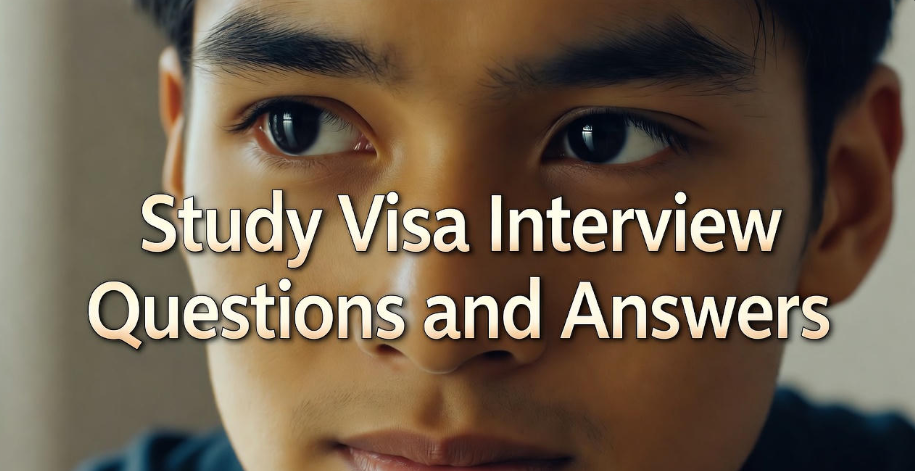
Common Mistakes to Avoid
-
Giving long, confusing answers
-
Speaking negatively about your country
-
Not knowing about your university or course
-
Showing interest in settling abroad permanently
-
Providing false financial details
Remember, visa officers are not your enemies — they just want to confirm you’re a genuine student. If your intentions are pure and you’ve prepared honestly, you’ll do great.
FAQs: Study Visa Interview Questions and Answers
Q1: How long does a study visa interview usually take?
Usually, it takes 5 to 15 minutes. Some questions are quick; others depend on your answers.
Q2: What language will the interview be in?
Mostly English, but simple and clear communication matters more than perfect grammar.
Q3: Should I memorize my answers?
No, just practice them. Memorized answers sound robotic. Speak naturally.
Q4: What if I don’t know an answer?
It’s okay to say, “I’m not sure, but I believe…” or “I’ll need to confirm that.” Honesty is respected.
Q5: Do all students get interviewed?
Not always. Some countries like Canada or the UK sometimes skip interviews, but others like the USA often require it.
Q6: How should I dress for the interview?
Formal or semi-formal attire — neat, simple, and professional.
Final Thoughts
A study visa interview isn’t a test of your intelligence — it’s a test of your intentions and clarity.
If you truly wish to study abroad and have done your research, your confidence will shine through.
Practice your answers, stay honest, and most importantly — be yourself. ✈️
